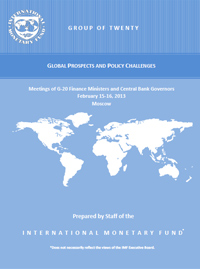Group of Twenty IMF Note-- Meetings of G-20 Finance Ministers and Central Bank Governors
IMF Note on Global Prospects and Policy Challenges
February 15-16, 2013, Moscow
About the Executive Summary
The Following executive summary is from a note by the Staff of the IMF prepared for the February 15-16, 2013 meetings of G-20 Finance Ministers and Central Bank Governors in Moscow.
Read the Full text ![]() and the Annex
and the Annex ![]()
Executive Summary
Financial markets have rallied and near-term stability risks have eased in response to better policies, but this is translating to activity very slowly. Decisive actions in the euro area and the United States have contained the most immediate threats to the global recovery. Financial markets have rallied and equity price volatility has fallen to pre-crisis levels. However, lead indicators suggest that real activity will strengthen only gradually, as easier financial conditions take time to transmit to the broader economy.
Despite an improving economy and better policies, significant downside risks remain. These relate to the potential for stalled policy implementation in the euro area, unsustainable public finances in the United States and Japan, and further growth disappointments in emerging economies. However, there are also upside risks from better financial conditions and confidence.
Policymakers cannot afford to let up their efforts. While near-term threats have been avoided, important medium-term challenges remain. The imperatives remain broadly unchanged. Specifically:
- The euro area should proceed towards a genuine economic and monetary union. Rolling back financial fragmentation is also essential to improve the transmission of monetary policy. This will require making tangible progress toward a banking union with greater fiscal integration.
- In advanced economies, fiscal consolidation needs to continue at a gradual and sustained pace, supported by accommodative monetary policy. Fiscal adjustment and targets in most advanced economies are broadly appropriate. Consolidation must be supported by the adoption and implementation of concrete medium-term consolidation plans in the United States and Japan, where the recently-announced stimulus makes this even more urgent. U.S. authorities should act early and decisively to durably raise the debt ceiling and avert automatic spending cuts. More generally, advanced economies need to curtail rising age-and health-related spending.
- Policy responses for emerging economies vary. With short-term risks to activity abating, the general challenge is to rebuild fiscal space. Some emerging economies can afford to maintain current monetary policy settings, while others may have to gradually tighten. In countries with strong capital inflows or still-elevated credit growth, supervisory and macroprudential measures should be deployed to curb sectoral excesses.

